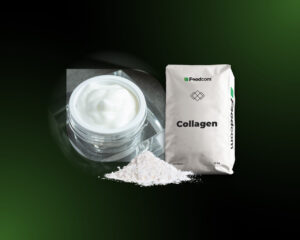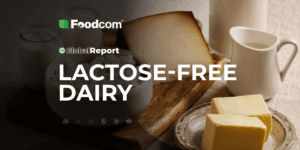- Collagen has become a strategic ingredient in the global health & wellness market, going beyond the beauty niche.
- By 2030, the market will almost double in size, driven by aging populations, younger consumers, and innovative formulas.
- The most dynamically growing segments are nutricosmetics, longevity, and vegan biotech alternatives.
- The success of companies depends on innovation, supply chain transparency, and the ability to build consumer trust.
Collagen is one of the most recognised proteins in the health & wellness industry. Its importance goes far beyond its structural function in the human body, it has become the foundation of modern supplementation, cosmetology and functional foods. In 2025, we see that collagen is no longer just an ingredient associated with beauty, but acts as an all-round health support, addressing the needs of both the physically active and the ageing population. The increasing number of innovative formulations, the development of biotechnology and growing consumer awareness make this market one of the most promising segments of global wellness.
Applications and market segmentation
The largest market share is in human supplementation, mainly products that improve the condition of skin, hair, nails and support joints. The nutricosmetics segment is growing dynamically, where collagen has become the basis of anti-aging formulas, often combined with hyaluronic acid, vitamin C or MSM.
In medicine, collagen is used in orthopaedics, implantology and wound treatment, and in veterinary medicine, in formulations for dogs, cats and horses to improve mobility and coat condition.
Marine collagen, seen as a premium raw material, and biotechnological alternatives produced by fermentation processes are gaining in importance, responding to the growing demand for vegan and sustainable products.
Global market dynamics
The global collagen market reached a value of approximately US$9.9 billion in 2024. It is forecast to grow to more than USD 18.7 billion by 2030, corresponding to an average annual growth rate of 11.3%.
Some analyses defining the market more narrowly, taking into account only selected segments, report lower figures, around USD 4.9-5 billion in 2024 and forecast a CAGR of 5.8%. The differences are due to different methodologies and scope of analysis, but all reports confirm that collagen remains one of the fastest growing ingredients in the health & wellness industry.
The market dynamics are primarily driven by three factors. Firstly, an ageing population is increasing demand for supplements to support skin and joint health. Secondly, younger generations are looking at collagen as part of a lifestyle based on prevention and aesthetics. Thirdly, the increasing availability of modern forms, such as collagen peptides with high bioavailability, is facilitating product popularisation.
Sales channels are also changing. E-commerce and subscription models are becoming standard, allowing manufacturers to build long-term relationships with consumers.
2025 confirms that collagen has moved from a niche ingredient to a strategic component of the global health & wellness market, and that its continued growth will depend on the industry’s ability to innovate and maintain consumer confidence.
Regional analysis of the Collagen market
The global collagen market is not homogeneous, with different regions showing different dynamics and consumption patterns.
North America
Remains the largest collagen market, accounting for more than a third of global revenues. Demand is driven by high consumer health awareness, a developed premium supplement segment and a strong presence of direct-to-consumer brands. The fastest growing categories are nutricosmetics and anti-aging products.
Europe
Developing steadily, with an annual growth rate of around 7%. The largest markets are Germany, France, Italy and the UK, where consumers particularly value quality certification, transparency and clean label products. There is growing interest in marine collagen in the region, which is seen as a premium alternative to animal raw materials.
Asia Pacific
Asia Pacific is currently the fastest growing market, with projected growth of up to 9-11% per year. The biggest contributors are China, Japan and South Korea, where collagen has firmly established itself in the beauty and functional food segments. In India and Australia, meanwhile, sports supplementation and veterinary products have a significant share.
Latin America
Remains an emerging market, particularly in Brazil and Mexico. A growing middle class and the popularisation of online shopping support the growth of collagen supplements, although the market is less saturated than in Europe or North America.
Middle East and Africa
This is the smallest but gradually growing segment. In countries such as the UAE, Saudi Arabia and South Africa, collagen mainly reaches the premium segment as an ingredient in anti-aging supplements and functional cosmetics. The distribution infrastructure is still limited, but growing consumer health awareness indicates the potential for further growth.
Trends and forecasts for the Collagen market (2025 and beyond)
The collagen market in the coming years will be shaped by the personalisation of supplementation and the development of data-driven models. Companies are increasingly using mobile apps and e-commerce platforms to track the effects of supplementation and customise formulas for individual consumers.
The longevity segment is also growing strongly, targeting the 50s who view collagen as part of longevity prevention and quality of life support. Products in this category are increasingly communicating not only aesthetic benefits, but also effects on metabolic health, bone density or muscle regeneration.
Clinical documentation of efficacy is also becoming increasingly important. Brands are investing in research to validate the effects of their formulas and differentiate themselves from the competition. Transparency and scientifically proven efficacy are becoming important factors in building trust.
At a strategic level, consolidation is also evident, with larger players acquiring smaller companies to secure access to raw materials, proprietary technologies and new sales channels. This heralds further professionalisation of the market, where players capable of scaling innovation and meeting increasing regulatory requirements will dominate.
Product formats are shifting towards convenience, with shots, jellies and sachets replacing classic powders. E-commerce channels and subscription models, enabling personalised supplementation, are growing rapidly.
Regulations in Europe and the US are enforcing full transparency in the supply chain and fostering the highest quality standards.


Collagen has ceased to be a fashion accessory and has become a strategic component of the global health and beauty market. In the coming years, the success of manufacturers will no longer be determined by access to raw material alone, but by the ability to create premium formulations, investments in biotechnology and supply chain transparency. Companies that understand that the consumer expects both results and ethics will build a sustainable competitive advantage.”
Global Foodcom S.A. reports.
Curious about what’s next for Collagen? Discover the latest trends and insights that will shape the final months of 2025. Visit our blog as we regularly update our global reports. Stay up to date with Foodcom S.A.
![Collagen Market Overview 2025 [Global Report] Collagen Market Overview 2025 [Global Report]](https://foodcom.pl/wp-content/uploads/2025/09/Global-Report-szablon-pod-bloga-Collagen-1520x760.png)


![Analiza rynku Colostrum w 2025 [Global Report] Analiza rynku Colostrum w 2025 [Global Report]](https://foodcom.pl/wp-content/uploads/2025/08/Global-Report-szablon-pod-bloga-colostrum-300x150.png)
![Analiza rynku MSM w 2025 [Global Report] Analiza rynku MSM w 2025 [Global Report]](https://foodcom.pl/wp-content/uploads/2025/08/global-report-msm-300x150.png)



